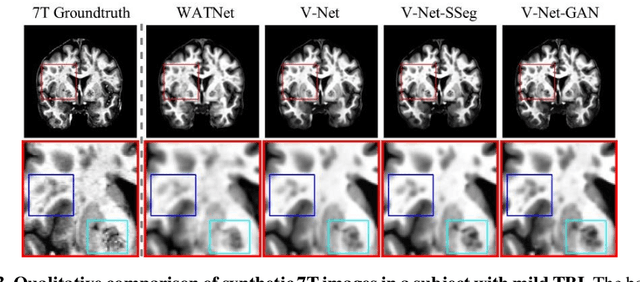7T MRI Synthesization from 3T Acquisitions
Paper and Code
Mar 13, 2024



Supervised deep learning techniques can be used to generate synthetic 7T MRIs from 3T MRI inputs. This image enhancement process leverages the advantages of ultra-high-field MRI to improve the signal-to-noise and contrast-to-noise ratios of 3T acquisitions. In this paper, we introduce multiple novel 7T synthesization algorithms based on custom-designed variants of the V-Net convolutional neural network. We demonstrate that the V-Net based model has superior performance in enhancing both single-site and multi-site MRI datasets compared to the existing benchmark model. When trained on 3T-7T MRI pairs from 8 subjects with mild Traumatic Brain Injury (TBI), our model achieves state-of-the-art 7T synthesization performance. Compared to previous works, synthetic 7T images generated from our pipeline also display superior enhancement of pathological tissue. Additionally, we implement and test a data augmentation scheme for training models that are robust to variations in the input distribution. This allows synthetic 7T models to accommodate intra-scanner and inter-scanner variability in multisite datasets. On a harmonized dataset consisting of 18 3T-7T MRI pairs from two institutions, including both healthy subjects and those with mild TBI, our model maintains its performance and can generalize to 3T MRI inputs with lower resolution. Our findings demonstrate the promise of V-Net based models for MRI enhancement and offer a preliminary probe into improving the generalizability of synthetic 7T models with data augmentation.
 Add to Chrome
Add to Chrome Add to Firefox
Add to Firefox Add to Edge
Add to Edge